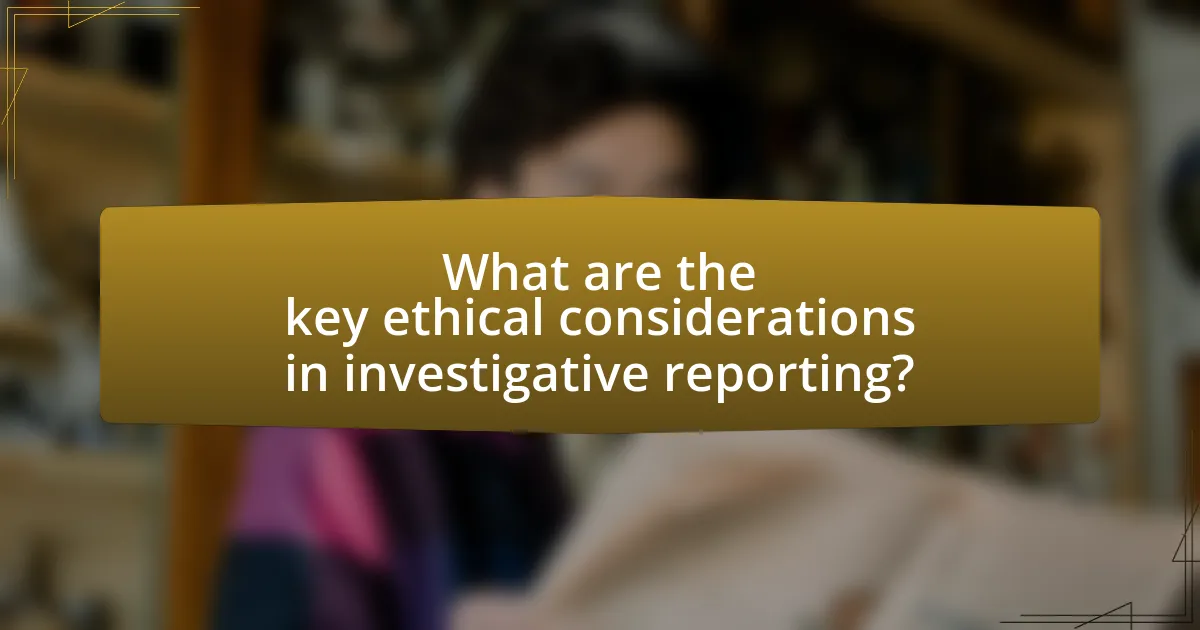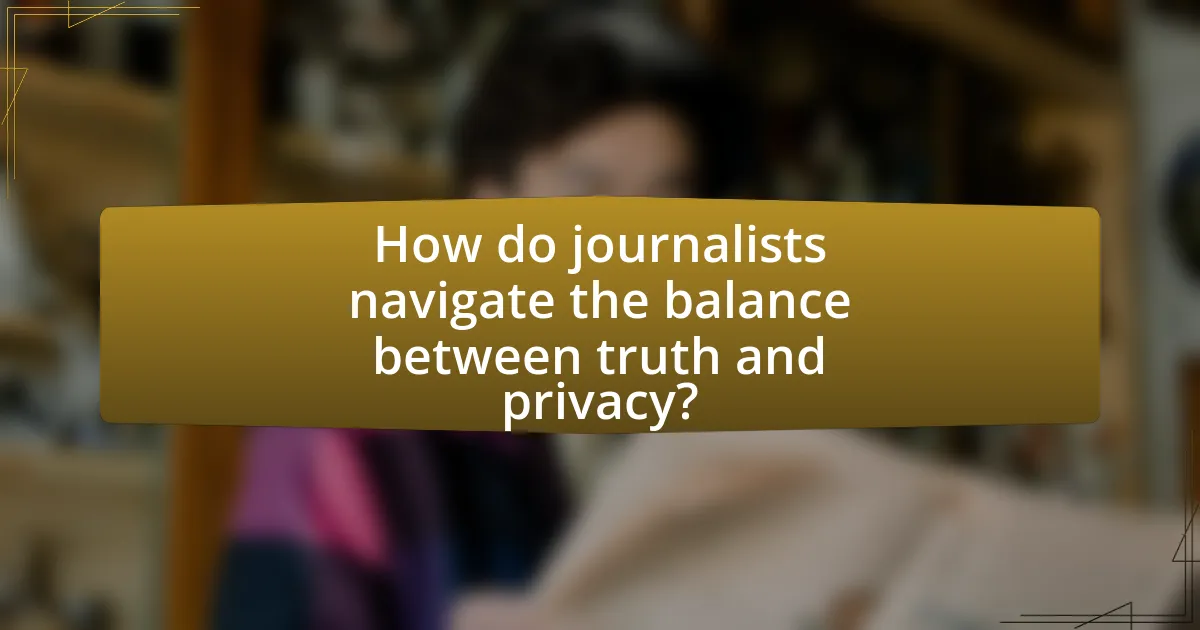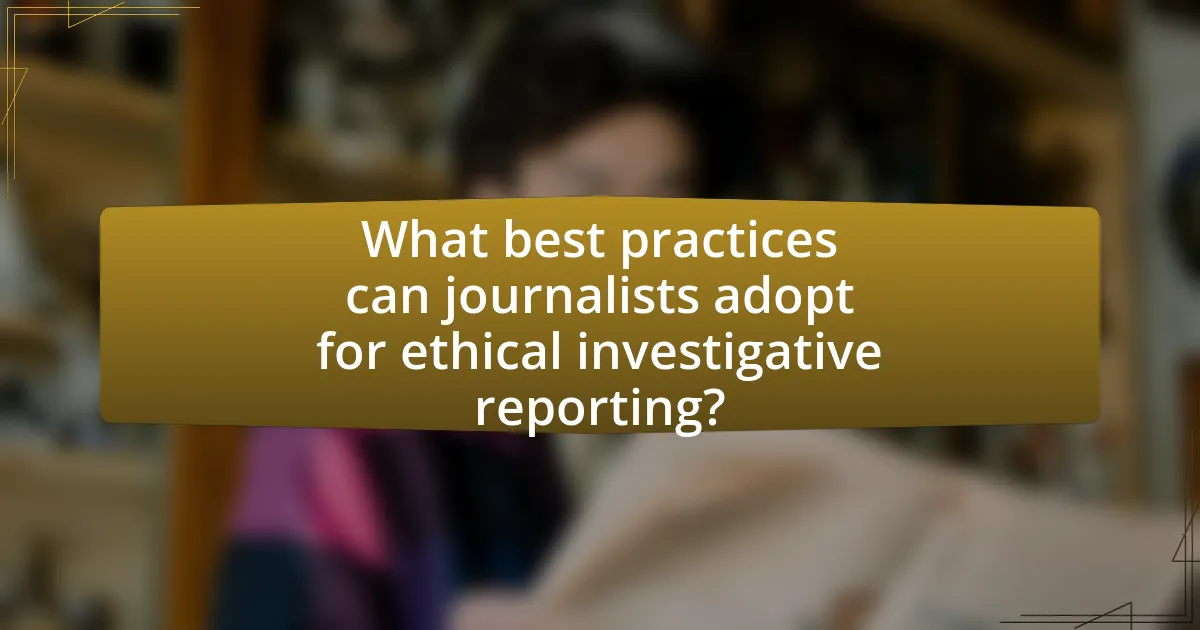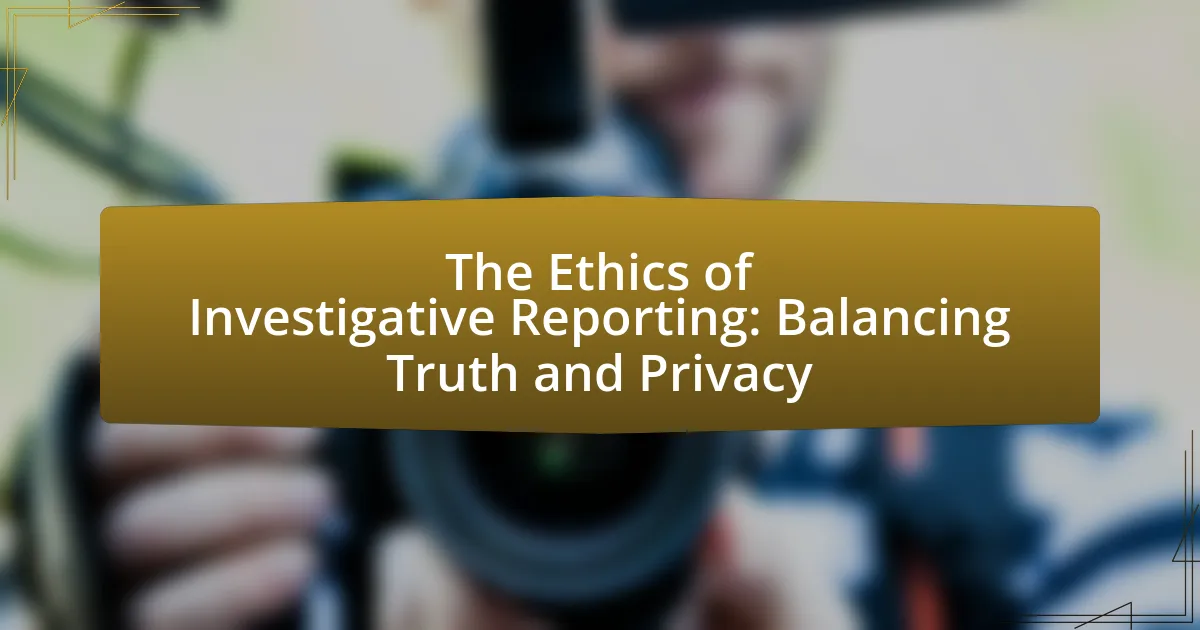The article focuses on the ethics of investigative reporting, emphasizing the critical balance between truth and privacy. It outlines key ethical considerations such as accuracy, fairness, and the potential harm to individuals involved in reporting. The intersection of truth and privacy is explored, highlighting the ethical obligation to report factual information while respecting confidentiality. The implications of prioritizing truth over privacy, strategies for maintaining ethical standards, and the role of public interest in guiding journalistic practices are also discussed. Additionally, the article examines the impact of cultural attitudes on journalistic ethics and provides best practices for ethical investigative reporting.

What are the key ethical considerations in investigative reporting?
The key ethical considerations in investigative reporting include accuracy, fairness, privacy, and the potential harm to individuals involved. Accuracy is crucial as reporters must ensure that the information they present is factual and well-substantiated, as seen in the case of the Watergate scandal, where thorough fact-checking led to significant political accountability. Fairness requires journalists to provide balanced perspectives, allowing all parties to respond to allegations, which is essential for maintaining credibility. Privacy concerns arise when reporting on sensitive subjects, necessitating a careful assessment of the public interest versus individual rights, as highlighted by the ethical dilemmas faced in high-profile cases like the reporting on sexual assault allegations. Finally, the potential harm principle emphasizes the need to consider the consequences of publishing information, particularly if it could lead to unjust repercussions for individuals or communities.
How do truth and privacy intersect in investigative journalism?
Truth and privacy intersect in investigative journalism through the ethical obligation to report factual information while respecting individuals’ rights to confidentiality. Investigative journalists often uncover sensitive information that can reveal wrongdoing or corruption, which serves the public interest; however, this pursuit of truth must be balanced against the potential harm to individuals’ privacy. For instance, the Society of Professional Journalists’ Code of Ethics emphasizes the need to minimize harm, indicating that journalists should consider the impact of their reporting on people’s lives. This ethical framework illustrates that while the truth is paramount for accountability, the protection of privacy is equally important to uphold ethical standards in journalism.
What are the implications of prioritizing truth over privacy?
Prioritizing truth over privacy can lead to increased transparency and accountability, but it may also result in harm to individuals’ reputations and personal lives. When truth is emphasized, investigative reporting can expose corruption, injustice, and societal issues, fostering informed public discourse. However, this pursuit can infringe on personal privacy, potentially causing distress or damage to individuals involved, especially if sensitive information is disclosed without consent. For instance, the publication of private details in high-profile cases has led to public backlash and legal challenges, highlighting the ethical dilemma faced by journalists. Balancing these implications is crucial to uphold both the integrity of the truth and the respect for individual privacy rights.
How can journalists respect privacy while pursuing the truth?
Journalists can respect privacy while pursuing the truth by adhering to ethical guidelines that prioritize consent and the relevance of information. Ethical journalism emphasizes the importance of obtaining consent from individuals before disclosing private information, ensuring that the public interest justifies any invasion of privacy. For instance, the Society of Professional Journalists’ Code of Ethics advises journalists to “show compassion for those who may be affected adversely by news coverage” and to “recognize that gathering and reporting information may cause harm or discomfort.” This principle is supported by case studies demonstrating that respecting privacy can enhance trust between journalists and the public, ultimately leading to more responsible reporting.
What role does public interest play in investigative reporting ethics?
Public interest serves as a foundational principle in investigative reporting ethics, guiding journalists in determining the relevance and necessity of their inquiries. It ensures that the pursuit of truth aligns with the needs and rights of the public, often justifying the exposure of wrongdoing or corruption that affects society. For instance, the Society of Professional Journalists emphasizes that ethical journalism should serve the public interest by providing information that is vital for informed decision-making. This principle helps journalists navigate the delicate balance between revealing important information and respecting individual privacy rights, thereby reinforcing accountability and transparency in governance and institutions.
How is public interest defined in the context of journalism?
Public interest in the context of journalism is defined as the principle that guides journalists to prioritize the welfare and rights of the public over individual privacy or proprietary interests. This concept is crucial in investigative reporting, where the dissemination of information serves to inform the public about matters that affect their lives, such as government accountability, social justice, and public safety. For instance, the U.S. Supreme Court has recognized that the public has a right to know about government actions that may impact their lives, as seen in cases like New York Times Co. v. Sullivan, which established the importance of free press in a democratic society.
What criteria determine whether a story serves the public interest?
A story serves the public interest when it addresses issues that significantly affect the community, promotes transparency, and holds power accountable. Criteria include the potential impact on public welfare, the relevance to societal issues, and the necessity of informing the public about matters that may influence their lives or rights. For instance, investigative reports on government corruption or public health crises exemplify stories that serve the public interest by revealing critical information that can lead to informed decision-making and societal change.
What are the potential consequences of unethical investigative reporting?
Unethical investigative reporting can lead to significant consequences, including damage to reputations, erosion of public trust, and potential legal repercussions. When journalists engage in unethical practices, such as fabricating sources or misrepresenting facts, they can unjustly harm individuals or organizations, resulting in reputational damage that may take years to repair. For instance, the case of the fabricated story by Rolling Stone in 2014 about an alleged gang rape at the University of Virginia illustrates how unethical reporting can lead to widespread misinformation and harm to innocent parties. Additionally, unethical practices can erode public trust in the media, as audiences become skeptical of the information presented to them, ultimately undermining the role of journalism in a democratic society. Legal consequences may also arise, including lawsuits for defamation or invasion of privacy, which can impose financial burdens on media organizations and journalists.
How can unethical practices damage journalistic credibility?
Unethical practices can significantly damage journalistic credibility by undermining trust between journalists and their audience. When journalists engage in misinformation, fabrication, or plagiarism, they violate ethical standards that are foundational to credible reporting. For instance, a study by the Pew Research Center found that 63% of Americans believe that news organizations are often influenced by political bias, which can stem from unethical practices. This perception leads to skepticism about the accuracy and reliability of news sources, ultimately eroding public confidence in journalism as a whole.
What legal repercussions can arise from violating privacy in reporting?
Violating privacy in reporting can lead to legal repercussions such as lawsuits for invasion of privacy, defamation claims, and potential criminal charges under privacy laws. Invasion of privacy occurs when an individual’s personal information is disclosed without consent, which can result in civil lawsuits where the affected party seeks damages. Defamation claims may arise if the reported information is false and harms the reputation of the individual involved. Additionally, certain jurisdictions have specific privacy laws that impose criminal penalties for unauthorized access to private information, such as wiretapping or hacking. These legal frameworks underscore the importance of adhering to ethical standards in investigative reporting to avoid significant legal consequences.

How do journalists navigate the balance between truth and privacy?
Journalists navigate the balance between truth and privacy by adhering to ethical guidelines that prioritize the public’s right to know while respecting individual privacy rights. They often assess the newsworthiness of information, weighing the significance of the truth against the potential harm to individuals involved. For instance, the Society of Professional Journalists emphasizes the importance of minimizing harm, which guides journalists in deciding whether to publish sensitive information. Additionally, legal frameworks, such as privacy laws, inform their decisions, ensuring that they do not infringe on personal rights while fulfilling their duty to inform the public.
What strategies can journalists employ to maintain ethical standards?
Journalists can maintain ethical standards by adhering to a code of ethics, ensuring accuracy, and practicing transparency. A code of ethics, such as the Society of Professional Journalists’ Code of Ethics, provides guidelines for integrity, fairness, and accountability in reporting. Ensuring accuracy involves fact-checking information and verifying sources, which is crucial for maintaining credibility; for instance, a 2019 study by the Pew Research Center found that 62% of Americans believe that accuracy is the most important quality in news reporting. Practicing transparency includes disclosing conflicts of interest and being open about the methods used in investigations, which fosters trust with the audience. These strategies collectively help journalists navigate the complexities of ethical reporting while balancing truth and privacy.
How can transparency enhance trust in investigative reporting?
Transparency enhances trust in investigative reporting by allowing audiences to understand the methods and sources behind the information presented. When journalists disclose their processes, including how they gather information and verify facts, it fosters credibility and accountability. For instance, a study by the American Press Institute found that 70% of respondents are more likely to trust news organizations that are open about their reporting methods. This openness not only builds confidence in the accuracy of the reporting but also encourages public engagement and dialogue, reinforcing the ethical responsibility of journalists to provide clear and honest narratives.
What role does consent play in ethical investigative practices?
Consent is fundamental in ethical investigative practices as it ensures respect for individuals’ autonomy and privacy. Ethical guidelines in journalism and research mandate obtaining informed consent from subjects before engaging in investigative activities, which protects individuals from potential harm and exploitation. For instance, the Society of Professional Journalists emphasizes the importance of minimizing harm and obtaining consent, highlighting that ethical reporting requires transparency and respect for the rights of those involved. This principle is supported by legal frameworks, such as the General Data Protection Regulation (GDPR), which enforces strict consent requirements for personal data collection and processing. Thus, consent not only legitimizes investigative efforts but also fosters trust between investigators and the public.
How do different cultures approach the ethics of investigative reporting?
Different cultures approach the ethics of investigative reporting through varying lenses of societal values, legal frameworks, and historical contexts. For instance, in Western cultures, particularly in the United States, there is a strong emphasis on freedom of the press and the public’s right to know, often prioritizing transparency over privacy. This is supported by legal protections such as the First Amendment, which encourages investigative journalism as a means to hold power accountable. Conversely, in many Asian cultures, such as in Japan and China, there is a greater focus on social harmony and respect for privacy, which can lead to more restrictive practices in investigative reporting. In these contexts, journalists may face legal repercussions for reporting that is perceived as harmful to societal stability or national security. Additionally, in Scandinavian countries, a balance is often sought, where ethical guidelines emphasize both the importance of truth and the protection of individual privacy, reflecting a societal consensus on the need for responsible journalism. These cultural differences highlight how ethical considerations in investigative reporting are shaped by local norms and legal standards.
What are the variations in privacy laws across countries?
Privacy laws vary significantly across countries, reflecting diverse cultural, legal, and political contexts. For instance, the European Union’s General Data Protection Regulation (GDPR) establishes stringent data protection standards, emphasizing individual consent and rights, while the United States employs a more fragmented approach, with sector-specific regulations like the Health Insurance Portability and Accountability Act (HIPAA) for health data and the California Consumer Privacy Act (CCPA) for consumer data. In contrast, countries like China enforce strict state control over data, prioritizing national security over individual privacy rights. These differences illustrate how privacy laws are shaped by national priorities, leading to a complex global landscape where compliance and enforcement mechanisms vary widely.
How do cultural attitudes towards privacy influence journalistic ethics?
Cultural attitudes towards privacy significantly influence journalistic ethics by shaping the standards and expectations for what information can be reported and how it should be handled. In societies that prioritize individual privacy, journalists may adopt more stringent ethical guidelines to avoid infringing on personal rights, leading to a more cautious approach in investigative reporting. For instance, in countries like Germany, strong privacy laws reflect a cultural emphasis on personal data protection, which compels journalists to navigate ethical dilemmas carefully when reporting on sensitive topics. Conversely, in cultures where transparency is valued over privacy, such as in the United States, journalists may feel more empowered to disclose information that serves the public interest, even if it encroaches on individual privacy. This divergence illustrates how cultural norms dictate the balance between the pursuit of truth and the respect for privacy, ultimately guiding journalistic practices and ethical considerations in different contexts.

What best practices can journalists adopt for ethical investigative reporting?
Journalists can adopt several best practices for ethical investigative reporting, including thorough fact-checking, transparency with sources, and respecting privacy. Thorough fact-checking ensures that information is accurate and reliable, which is essential for maintaining credibility; for instance, the Society of Professional Journalists emphasizes accuracy as a core principle. Transparency with sources involves disclosing potential conflicts of interest and the methods used to gather information, fostering trust with the audience. Respecting privacy means considering the potential harm to individuals involved in the investigation, aligning with ethical guidelines set forth by organizations like the American Press Institute, which advocate for minimizing harm while pursuing the truth.
How can journalists effectively balance truth and privacy in their work?
Journalists can effectively balance truth and privacy by adhering to ethical guidelines that prioritize the public’s right to know while respecting individual privacy rights. This balance can be achieved through careful consideration of the relevance of information to the public interest, ensuring that the disclosure of private details is justified by the significance of the story. For instance, the Society of Professional Journalists emphasizes the importance of minimizing harm, which includes weighing the potential impact of revealing private information against the necessity of that information for informing the public. Additionally, journalists can seek consent when appropriate and utilize anonymization techniques to protect identities, thereby maintaining the integrity of their reporting while safeguarding individuals’ privacy.
What guidelines should journalists follow when handling sensitive information?
Journalists should prioritize accuracy, confidentiality, and sensitivity when handling sensitive information. They must verify facts before publication to ensure the information is correct, as inaccuracies can harm individuals and undermine public trust. Maintaining confidentiality is crucial; journalists should protect the identities of sources who provide sensitive information, especially in cases involving vulnerable populations. Additionally, they should assess the potential harm that disclosing sensitive information may cause to individuals or communities, weighing the public’s right to know against the potential for harm. Ethical guidelines, such as those from the Society of Professional Journalists, emphasize the importance of minimizing harm and acting with integrity in reporting.
How can ongoing training improve ethical decision-making in journalism?
Ongoing training can significantly improve ethical decision-making in journalism by equipping journalists with updated knowledge of ethical standards and practices. Regular training sessions can address emerging ethical dilemmas, such as those related to digital privacy and misinformation, ensuring that journalists are prepared to navigate complex situations. For instance, the Society of Professional Journalists emphasizes the importance of continuous education in maintaining ethical integrity, highlighting that informed journalists are better able to balance the public’s right to know with individuals’ rights to privacy. This ongoing education fosters a culture of accountability and ethical awareness, ultimately leading to more responsible reporting.
What resources are available for journalists to enhance their ethical practices?
Journalists can enhance their ethical practices through various resources, including professional organizations, training programs, and ethical guidelines. Organizations such as the Society of Professional Journalists (SPJ) provide a Code of Ethics that outlines principles for ethical journalism, emphasizing accuracy, fairness, and accountability. Additionally, the Poynter Institute offers workshops and online courses focused on ethical decision-making in journalism. The International Federation of Journalists (IFJ) also provides resources and guidelines to help journalists navigate ethical dilemmas, particularly in investigative reporting. These resources collectively support journalists in maintaining high ethical standards while balancing the need for truth and privacy.
What organizations provide support and training for ethical journalism?
Organizations that provide support and training for ethical journalism include the Society of Professional Journalists (SPJ), the International Federation of Journalists (IFJ), and the Poynter Institute. The SPJ offers resources and training focused on ethical standards and practices in journalism, while the IFJ advocates for journalists’ rights and provides training on ethical reporting globally. The Poynter Institute is renowned for its educational programs that emphasize ethical journalism and best practices. These organizations collectively contribute to the advancement of ethical standards in the field of journalism.
How can journalists stay informed about evolving ethical standards?
Journalists can stay informed about evolving ethical standards by actively engaging with professional organizations, attending workshops, and following industry publications. Professional organizations such as the Society of Professional Journalists and the International Federation of Journalists regularly update their ethical guidelines and provide resources for journalists to understand current standards. Workshops and conferences offer opportunities for journalists to discuss ethical dilemmas and learn from experts in the field. Additionally, industry publications like the Columbia Journalism Review and Poynter Institute frequently address changes in ethical practices, ensuring that journalists remain aware of the latest developments.

Leave a Reply